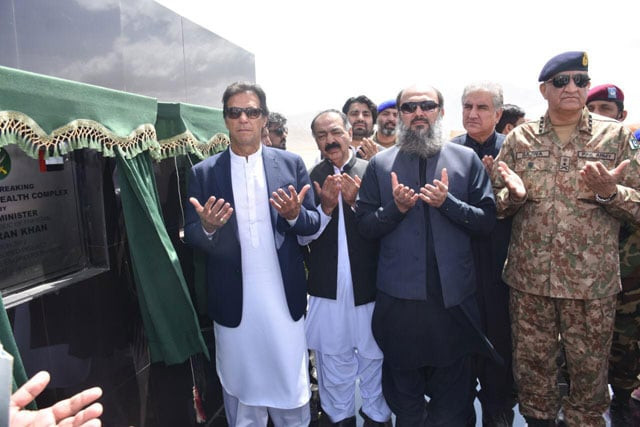Imran launches work on mega projects in Balochistan
PM sees Gwadar becoming the country's engine of development in coming years

PM Imran performs ground-breaking of Balochistan Health Complex. PHOTO COURTESY: ISPR
Addressing the ceremonies held in this connection, Imran extended his gratitude to Chief of Army Staff General (COAS) Qamar Javed Bajwa for his assistance in setting up the health complex.
A number of federal and provincial ministers, the COAS, Chinese Ambassador to Pakistan Yao Jing and representatives of various departments were also present on these occasions.
"The federal government is serious in providing basic necessities to the people of Balochistan," the prime minister said, adding, "A cancer hospital will also be set up in Quetta in collaboration with provincial government and the armed forces."
The prime minister categorically said that any development would be of no use unless it benefitted the local populations. In the past, he observed, the locals were ignored while executing development projects in Balochistan.
"Gas worth billions of rupees was extracted from Sui but it didn't change the living standards of the locals," he said and added, "We can change this in Balochistan by adopting a local government system like the one in Khyber Pakhtunkhwa to streamline the distribution of funds at the grassroots level."
The prime minister noted that village councils set up under the new local government system had brought about a significant change in the funds allocation mechanism.
Imran said the shortage of skilled labour in Balochistan could be addressed through skill development centres.
He also reassured the fisherfolk of Gwadar that they should not worry about their sustenance as special bridges would be built to facilitate them.
The prime minister also unveiled several railway connectivity schemes. He said the railways minister was already working on establishing a rail link between Quetta and Taftan. He also announced that Gwadar and Quetta would be linked through a railway track.
For upgrading the railways system, Imran said, the government was seeking Chinese support, which had the most advanced system. "One can travel from Karachi to Lahore within four hours if you take a Chinese train," he added.
Focus on Gwadar
The prime minister said Gwadar would be the engine of development for the entire country in the coming years.
The prime minister announced the launch of the Insaf Sehat Card in Gwadar, the expansion of the hospital there as well as the setting up of a solid waste management system. He said Gwadar would be provided electricity by linking it to the national grid soon.
"One million saplings would be planted in Gwadar," Khan said. He added that following the models of Dubai, Abu Dhabi and Sharjah, the government has decided to recycle water in Gwadar. A desalination plant will be set up in Gwadar under the 'Clean and Green Pakistan' project.
The prime minister said a cargo and passenger ferry service would also be launched from Gwadar to Karachi that would later be extended to Qatar.
Lauding the dedication of Balochistan Chief Minister Jam Kamal towards the progress and prosperity of the province, Khan urged the provincial government to prepare a master plan for Quetta. "The population and expansion of a city are interlinked and they need to be administered through master plans."
Earlier, Chief Minister Kamal appreciated the prime minister's efforts for resolving the issues faced by the province. "Balochistan is an underprivileged province and needs the federal government's special focus," he added.
The double carriageway, the health complex and other projects will be executed under a joint venture between the army and the provincial government. The army in collaboration with the Balochistan government has planned the construction of a state-of-the-art cardiac centre in Quetta.
The project is part of the Khushal Balochistan Programme aimed at providing the medical facilities to the people under the Urban Poverty Alleviation Programme projects sponsored by United Arab Emirates.
The cardiac hospital comprises operation theatres and echo and nuclear-cardio facilities. A bio-medical workshop and a waste management plant will also be constructed to make the facility environment-friendly.
The Quetta-Zhob (N-50) highway will link Quetta with Zhob passing through Kuchlak, Muslim Bagh and Qilla Saifullah, hence reducing the travel duration between Quetta and Dera Ismail Khan from 12 houes to four hours.
It will create socioeconomic activity for the locals by providing access to minerals and mines and direct access to main markets. The road will also facilitate speedy transportation of goods from Khyber Pakhtunkhwa to the Karachi port.
The N-50 is primary sub-regional corridor running parallel to the western border, connecting Afghanistan and Iran with Pakistan that would provide vital connectivity of China-Pakistan Economic Corridor western alignment leading to Gwadar Port.
The New Gwadar International Airport was included in the Early Harvest High Priority Project of China-Pakistan Economic Corridor in January 2014. The Chinese government is assisting in the construction of the airport under Chinese Grant Assistance.
The project is part of overall infrastructure development of Balochistan. It will be developed as a green-field facility with all modern facilities for safe operation. The airport will be able to accommodate large aircraft such as A380. IT would comprise a modern terminal building with cargo terminal having initial handling capacity of 30,000 tonnes per year.



















COMMENTS
Comments are moderated and generally will be posted if they are on-topic and not abusive.
For more information, please see our Comments FAQ